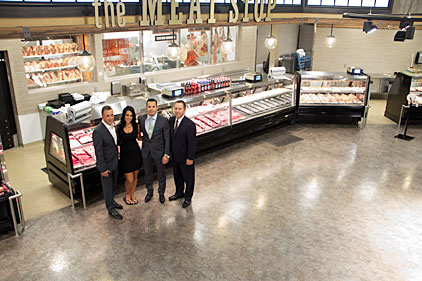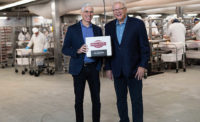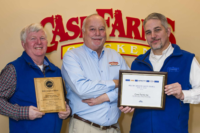Forty years ago, Ray Rastelli purchased a small butcher shop in South Jersey, brought his brother, Tony, into the business, and began growing their meat-cutting operation to serve local customers and restaurants in the region.

|
| Posing for a photo at the full-service meat counter during the sneak-preview event for Rastelli Market Fresh in Marlton, N.J., are (left to right) Tony Rastelli, owner; Lauren Rastelli, director of marketing, Rastelli Foods Group; Ray Rastelli III, vice president, Rastelli Direct; and Ray Rastelli, owner. |
Fast-forward to the present day, and Ray and Tony lead a fast-growing company that has taken on challenge after challenge, having added to that meat-cutting business: a seafood operation, a global export business, a successful online food storefront and most recently a full-service specialty retail store.
Indeed, the Rastelli brothers have come full circle with the grand opening of Rastelli Market Fresh in Marlton, N.J., in July 2014 — featuring “The Meat Stop” full-service meat counter, named after the butcher shop where it all started decades prior.
“What has kind of propelled it over the years is our meat manufacturing and seafood expertise,” Ray Rastelli says. “So we looked at that and asked how we could leverage our manufacturing operations to bring a better product to the consumer.”
About five years ago, Ray says, the company began to look at producing items for the retail marketplace after having much success on the foodservice side.
“We wanted to be able to manufacture more product in a more efficient, cost-effective manner, and integrating retail production with our foodservice production gave us a real positive flow of product,” Ray says. “Now, this retail store gives us the opportunity to share that product, and more importantly, test it in the marketplace.”
Despite its fast growth and success, Rastelli Foods is well aware of the customers it targets with any of its product offerings — as Ray says, it simply cannot operate as a commodity-driven company.
“We’re trying to reach the consumer who wants a special steak raised in a special area and fed a special diet,” he explains. “We’ve gone in-depth with our marketing to explain where we raise our animals, how we harvest them and how we process them, to make connections with the consumers. That ‘foodie’ type consumer is our consumer.”
Naturally, consumers looking for that type of experience around their food purchases led Rastelli Foods to open the retail store as well. Soon, the company expects to marry Rastelli Direct with Rastelli Market Fresh, allowing shoppers to order any of the 50,000 SKUs online from in the store to be delivered directly to their home as well.
Rooted in efficiency, growth
It almost goes without saying, but as Rastelli Foods’ business opportunities have produced such bountiful harvests, so too has the need developed for additional operational space. Certainly, many expansions have happened in the 40 years since The Meat Stop butcher shop opened.
In fact, Rastelli Foods broke ground this spring on an expansion of its Swedesboro, N.J., processing facility (acquired in 2003), which will add approximately 50,000 square feet of floorspace.
According to Ray, the expansion will house a new cold-storage warehouse, and then the company will renovate an area that currently houses hallways, finished goods and raw goods, thereby adding processing space.
“How do we make our facilities more cost-effective?” Ray asks. “Adding 50,000 square feet and roughly 5,000 SKUs of refrigerated and frozen space gives us an opportunity to purchase at a better volume and rate.”
Once the renovations are complete, Rastelli Foods will have a better, more efficient process flow through its facility.
“This increases our production capacity by 100 percent, but the real key is the way the processing lines will be set up and the automation we’re adding to the facility,” Ray says. “I still [believe] there is much more automation that can be done; we can be more cost-effective — we can be the low-cost provider with the highest quality product because of the efficiencies [in the process].”
| Click here to view our video Q&A with Ray Rastelli on their new specialty-retail store |
Rastelli Foods’ engineering staff earns praise from Ray for its work in developing solutions to move product “at the fastest pace with the cleanest sanitation and with as little human touch as possible.” Recent technological advancements have helped the company get even quicker in its process, he adds, by focusing on the integration between work areas, or “pods”.
“That’s where the glitches or hiccups always seemed to be, so we developed software that gives us the opportunity to feed and pace lines. This prevents backups, bottlenecks and stops,” Ray explains. “It’s really a cause for a much faster process in a much more sanitary condition and controlled environment.”
Furthermore, Rastelli Foods has added “smart platforms” that give real-time feedback to employees, management and suppliers on yields from station to station and packer to packer.
“It gives the trimmers, cutters, packers and management on the floor immediate feedback so they can make the adjustments not at the end of the day, shift or month — they can make the adjustment at that moment,” Ray says.
Global powerhouse
The story of Rastelli Foods’ rise in the global export marketplace would hold up as an excellent case-study on opportunistic entrepreneurship. During the first Persian Gulf War in the 1990s, Rastelli Foods had been cutting T-bone steaks for the U.S. military that were sent overseas through a distributor. When that distributor ran into some financial roadblocks that forced it to halt orders, Tony Rastelli contacted the customer directly, with little experience in the export business behind him, but a willingness to learn and earn the business outright. After earning an audience with the customer, Tony flew to Dubai and made his pitch.
“I met with him and told him our story,” he recalls. “Then he asked, ‘How many containers do you think you can do?’ I told him one per month. He said, ‘One per month? We buy 16 a week! You need to learn how to export; you need to stay here and learn.’ So I did, and I learned everything there was to learn.”
Rastelli Global was born and quickly took off as it proved its capabilities and the wars in the Middle East continued. Tony says at the height of the war in Iraq, Rastelli Global was shipping 300 containers per week. Along the way, Tony and Ray decided that the export business simply couldn’t be done out of the back of the processing facility, and Rastelli Global was moved to its own facility a couple miles from the corporate headquarters in Swedesboro.
Out of that facility ships an extremely eclectic mix of items (for a company that started out as a meat-cutting operation) that aren’t all protein products. For years now, the company has been exporting other food products and non-food products to its customers overseas. Furthermore, as the U.S. military has withdrawn its fighting forces over the years, Rastelli Global has diversified its customer base.
“We didn’t want to have to hang our hats on the U.S. being at war in order to be successful at global business,” Rastelli says. Today, Rastelli Global ships all types of food products globally to foodservice customers, and it also exports small wares and equipment as well.
“Everything that would be applicable to our foodservice customers’ franchises in the Middle East, Europe, Asia or South America, we deliver it to them,” Tony Rastelli explains. “Our customers go into our online system, where they can see every item and the manufacturer’s cost. Corporate negotiates the prices to them, and we deliver to over 80 countries.”
Tony says that in working with the military, Rastelli Global needed to develop its ordering system into a model for transparency and efficiency. As a result, the volumes at which the company consolidates and ships products allows for great flexibility for its customers as well.
“Instead of shipping a full container that will last [one customer] three months, we’ll divide containers between customers, allowing them to shrink down their inventory and always have products ‘on the water’ to them,” he adds. “We’re managing their inventory to where they’re taking less money out of their pockets, and if they forget to order an item, we constantly have containers shipping out — they don’t need to pay high air-freight costs.”
Having had such solid success on the foodservice side, the big push for growth on the global marketplace is via retail placements of the Rastelli brands. The brand already sells case-ready retail steaks in the Ukraine, and Tony Rastelli had plans at presstime to head to the Middle East to develop an American steak program with a supermarket chain there.
“They equate the U.S. products as being of high quality,” he says. “We’re taking all the knowledge and experience we have with our customers in the United States and making a thrust into the retail sector with Rastelli-branded products.”
On the export side, the company currently services all of the military contracts, Tony says. Thus, Rastelli Global is working to gain more franchise business and become the “sole distributor and information provider” to more of its customers.
Meanwhile, Rastelli Direct’s online reach has grown as well. Orders can be placed online in the countries of Bahrain and Kuwait, and more opportunities for growth exist there.
According to Tony, the phrases, “We can’t,” or “We won’t,” are not uttered in meetings, and given the company’s explosive and expansive growth globally, it appears to ring true.
“We might say, ‘This may be painful,’ but there is always a way to overcome everything,” he says. “So it comes down to, we like to be faced with challenges because the satisfaction of overcoming those challenges is really what makes life meaningful — to find solutions for ourselves and our customer partners.”
Many companies take on those challenges, but Tony believes that Rastelli Foods’ success stems from its adherence to the family values and morals.
“Whether it’s opening a store or doing business internationally, we believe in family first, doing the right things right, and being very open and transparent,” he says. “That basically has made us one of the largest consolidators overseas and one of the most successful producers in the United States.”









Report Abusive Comment